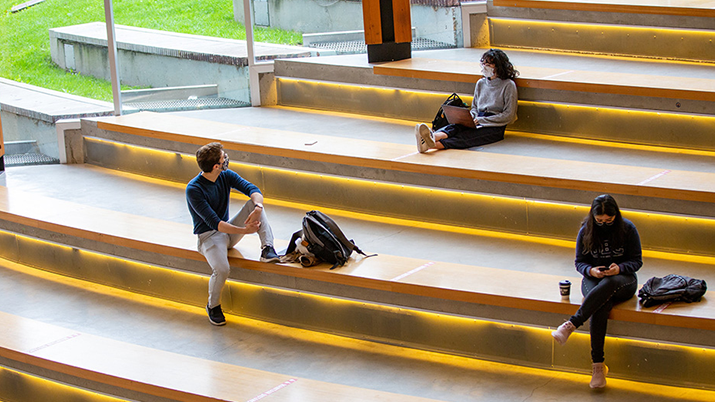

Photo: Jamil Rhajiak / UBC Brand & Marketing
There is scientific evidence that wearing masks reduces the spread of COVID-19. Despite this, many people are resistant to wearing them. To understand this resistance to wearing masks, cognitive scientists in UBC’s department of psychology conducted research with 500 people from five countries and 30 US states.
The researchers measured peoples’ emotional responses to individual COVID masks by showing them examples of protective masks and asking them to rate the attractiveness of the objects and the emotional intensity of their responses to them. They found that more experience of wearing a mask was associated with finding the masks more attractive and emotionally intense, and this association held regardless of ideology and workplace requirements.
The study, In the hands of the beholder: Wearing a COVID-19 mask is associated with its attractiveness was published in the Quarterly Journal of Experimental Psychology.
Dr. Veronica Dudarev, lead author of the study and a postdoctoral research fellow in UBC’s department of psychology, joins us to discuss this research and the role cognitive science can play in promoting mask wearing behaviours during a pandemic.
Can you tell us about this research?
In a study of ~ 500 people from 5 countries and 30 US states we ran a “consumer products evaluation” study and found that people who regularly use protective COVID items (masks, sanitizer, latex gloves) rate them as more attractive. Control items showed this was not true for non-COVID products (ski masks, winter gloves, shampoo). Further analyses showed that this relationship was there even after taking into account people’s ideology, for example doubt or belief in the dangers of COVID-19,) and workplace requirements to wear masks.
How did the study work?
In the end of July 2020, we invited online workers to participate in a study where we showed them a number of consumer products, one by one, asking them to rate attractiveness of these products. We then asked people about their habits around using protective masks, as well as their political orientation, beliefs about COVID and protective measures undertaken by their states, and their exposure to COVID. The same participants were tested again in October-November 2020, and the results were very stable across the two testing waves.
“Nobody likes protective masks, but the more and the longer one wears them, the less one dislikes them.”
How can this research promote mask use?
The mantra is “liking follows use.” This means that when we use a new item more often, and over a longer period of time, we think more highly of it — in short, we like it more. A practical implication is that societal measures to encourage mask wearing can add to its positive evaluation, whether that use comes about through personal choice or societal pressure.
What role can cognitive science play in understanding the mindset of anti-maskers?
Cognitive science has been studying why we find objects emotionally relevant for some time, asking questions like: How do preferences and other emotional “appraisals” come about? Is it related to familiarity of the object, experience of its use? A host of laboratory studies suggest that the objects that are attended to or chosen because you are going to act on them– often not voluntarily, when participants are “tricked” into choosing these objects by means of some experimental task – gain emotional value. In our study, we tested if this translates into the reality of COVID protection, and found that it does.
Nobody likes protective masks, but the more and the longer one wears them, the less one dislikes them.
The study co-authors include UBC Psychology PhD student Maria (Joey) Manaligod, and UBC Psychology Professors Dr. James Enns and Dr. Rebecca Todd.


